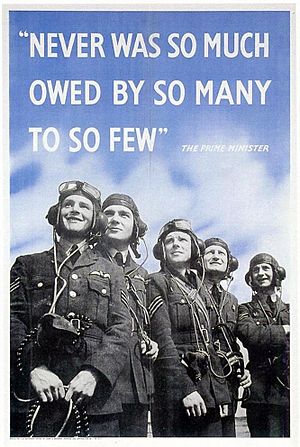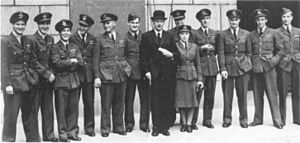Never was so much owed by so many to so few facts for kids
"Never was so much owed by so many to so few" is a very famous line from a speech given by British Prime Minister Winston Churchill. He said these words to the House of Commons (which is like the main meeting place for the UK government) on August 20, 1940.
The speech was about the amazing efforts of the Royal Air Force (RAF) and other Allied pilots. They were bravely fighting in the Battle of Britain. This was a huge air battle against the German air force, called the Luftwaffe, during World War II. The pilots who fought in this battle became known as "the Few". People still remember them on Battle of Britain Day, September 15. This speech is one of Churchill's most well-known, like "we shall fight on the beaches" and ""their finest hour"."
Contents
Why This Speech Was Important
This speech happened when Germany was planning to invade Britain. This plan was called Operation Sea Lion. In June 1940, Germany's Luftwaffe had many more planes than the RAF. Germany had about 2,550 planes, while the RAF had only 750.
How Churchill Got the Idea
Churchill first said the famous line a few days before his speech. On August 16, 1940, he visited the Battle of Britain Bunker at RAF Uxbridge. He was watching the battle unfold from the operations room. At one point, every single RAF squadron was fighting German planes. More German planes were also flying towards Britain.
After the fighting slowed down that evening, Churchill was very moved. He told his friend, Major General Hastings Ismay, "Never in the field of human conflict was so much owed by so many to so few."
Germany's Invasion Plans
The speech was given as Britain got ready for a possible German invasion. Towards the end of June 1940, secret codebreakers at Bletchley Park found a message. It showed that Germany wanted detailed maps of the UK. This suggested they planned to bring their anti-aircraft guns to Britain and Ireland. However, German leader Adolf Hitler knew his invasion could only work if the Royal Air Force was weakened or destroyed first.
What Churchill Said in the Speech
Churchill's speech lasted almost 50 minutes. He first pointed out that fewer people had been hurt in this war compared to the First World War. He said this war was not just a "huge slaughter." Instead, it was a "conflict of strategy, of organisation, of technical apparatus, of science, mechanics and morale."
The British casualties in the first 12 months of the Great War amounted to 365,000. In this war, I am thankful to say, British killed, wounded, prisoners and missing, including civilians, do not exceed 92,000, and of these a large proportion are alive as prisoners of war. Looking more widely around, one may say that throughout all Europe, for one man killed or wounded in the first year perhaps five were killed or wounded in 1914–15.
Praise for the Pilots
Churchill then talked about Britain's military readiness. He noted that they were making many more aircraft. This meant the UK could "continue the air struggle indefinitely." He praised the British fighter pilots and aircrews. This is where he used his famous phrase:
The gratitude of every home in our Island, in our Empire, and indeed throughout the world, except in the abodes of the guilty, goes out to the British airmen who, undaunted by odds, unwearied in their constant challenge and mortal danger, are turning the tide of the World War by their prowess and by their devotion. Never in the field of human conflict was so much owed by so many to so few.
While the speech is most famous for praising fighter pilots, Churchill also thanked bomber crews. He urged everyone not to forget their important work:
All hearts go out to the fighter pilots, whose brilliant actions we see with our own eyes day after day; but we must never forget that all the time, night after night, month after month, our bomber squadrons travel far into Germany, find their targets in the darkness by the highest navigational skill, aim their attacks, often under the heaviest fire, often with serious loss, with deliberate careful discrimination, and inflict shattering blows upon the whole of the technical and war-making structure of the Nazi power.
Other Topics in the Speech
Churchill also explained why British forces had left British Somaliland the week before. He said it was because France had decided to surrender. This made Britain's position there impossible.
He also defended the blockade of Germany. This blockade stopped supplies from reaching Germany and the areas it had taken over. Churchill admitted it could cause suffering but blamed the Nazis for it. He promised that Britain would give food and help to occupied countries once German forces were gone. This helped set up plans for helping countries after the war.
The end of the speech was about a deal with the United States. Britain gave the US permission to use military bases in the Caribbean and Newfoundland for 99 years. In return, the US gave Britain fifty American destroyers (a type of warship). Churchill presented this as a friendly gesture for shared safety, not just a trade of land for ships.
The Legacy of "The Few"
The speech is very well remembered for Churchill's use of the phrase "the few." This referred to the Allied aircrew who bravely defended the United Kingdom. Since then, they have always been known as "The Few."
Almost 3,000 aircrew from the United Kingdom, the Commonwealth, and other Allied countries fought in the Battle of Britain. About a third of them were either killed or wounded. They are honored with special ceremonies and flypasts (when planes fly over in formation) on the anniversary of Battle of Britain Day. This has happened on the 70th, 75th, and 80th anniversaries.
 | John T. Biggers |
 | Thomas Blackshear |
 | Mark Bradford |
 | Beverly Buchanan |



